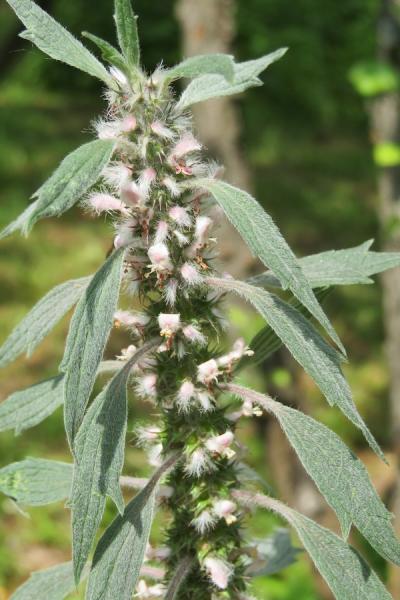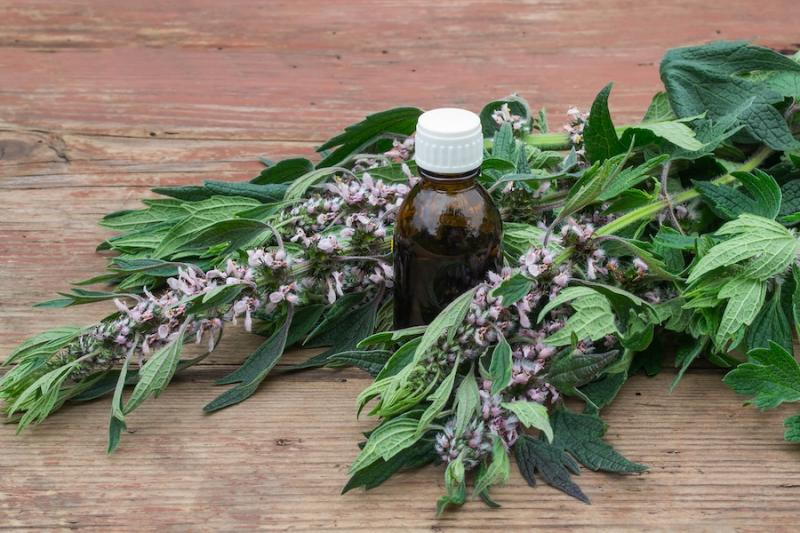
As you gain knowledge and experience using herbs, there are some remedies you’ll only use occasionally because you don’t have much need for them and others that you’ll use a lot because they have very clear indications for problems you encounter frequently. Motherwort is one of the latter remedies that I find I use frequently. I've used it with many people for a variety of health issues, and I've found it a reliable and effective remedy.
Both the common and Latin names for this plant give clues as to its uses. Wort is an old term for a remedy, so motherwort means that the plant has been traditionally used as a remedy for mothers. The early Greeks gave motherwort to pregnant women suffering from anxiety, which is how the plant got its common name.
The Latin name, Leonurus cardiac, is also revealing of its traditional uses. The species was named cardiaca comes from the Greek kardiaca, which means heart. Motherwort has a strong action on the heart. Leonurus comes from the Greek leon for lion and ouros for tail. The plant was thought to resemble the tail of a lion, but I also think it represents the courage of a lion and courage is an antidote for fear and anxiety.
Motherwort for Anxiety
 The first major use case I’d like to discuss for motherwort is anxiety, particularly anxiety in mothers. Mothers tend to worry a lot about their children, and children, who can be a source of great joy, can also be a source of a lot of stress. Motherwort is specifically indicated for nervous irritability, restlessness, depression, and insomnia in women. Maude Grieve wrote, “Motherwort is especially valuable in female weakness and disorders (hence the name), allaying nervous irritability and inducing quiet and passivity of the whole nervous system.” And, Nicolas Culpepper said, “There is no better herb to drive away melancholy vapors from the heart, to strengthen it and make the mind cheerful.” Motherwort combines well with other nervines for these problems, particularly skullcap (for nervous exhaustion), milky oat seed (for a depleted nervous system), and blue vervain (for driving oneself too hard).
The first major use case I’d like to discuss for motherwort is anxiety, particularly anxiety in mothers. Mothers tend to worry a lot about their children, and children, who can be a source of great joy, can also be a source of a lot of stress. Motherwort is specifically indicated for nervous irritability, restlessness, depression, and insomnia in women. Maude Grieve wrote, “Motherwort is especially valuable in female weakness and disorders (hence the name), allaying nervous irritability and inducing quiet and passivity of the whole nervous system.” And, Nicolas Culpepper said, “There is no better herb to drive away melancholy vapors from the heart, to strengthen it and make the mind cheerful.” Motherwort combines well with other nervines for these problems, particularly skullcap (for nervous exhaustion), milky oat seed (for a depleted nervous system), and blue vervain (for driving oneself too hard).
Other Female Problems
Motherwort also eases symptoms of PMS associated with stress and shock. It can ease premenstrual cramps, pelvic pain, and spasms in the vagina. It is also an emmenagogue, which can help with amenorrhea (delayed menstruation). It helps with clotty or scanty flow accompanied by cramps and can also help to expel the placenta after childbirth.
Matthew Wood gives some specific indications for the types of women for which motherwort is helpful. He says they have a tendency to a red face with staring eyes and a freaked out expression. They tend to be anxious and excessively emotional, not with anger, but with nervousness.
Motherwort for the Heart and Circulation
 What I find I use motherwort for the most often is problems with heart rate. Motherwort is a very helpful remedy for tachycardia or rapid hear beat, especially when this is due to stress. It’s been one of my most dependable go to herbs for this problem. It’s also helpful for heart palpitations associated with anxiety and nervousness. It’s also helpful for palpitations and heart irregularity during pregnancy, menstruation and menopause). You can combine motherwort with a small amount of lobelia to help slow down the heart rate. You also can combine it with hawthorn, olive leaf, and linden for hypertension.
What I find I use motherwort for the most often is problems with heart rate. Motherwort is a very helpful remedy for tachycardia or rapid hear beat, especially when this is due to stress. It’s been one of my most dependable go to herbs for this problem. It’s also helpful for heart palpitations associated with anxiety and nervousness. It’s also helpful for palpitations and heart irregularity during pregnancy, menstruation and menopause). You can combine motherwort with a small amount of lobelia to help slow down the heart rate. You also can combine it with hawthorn, olive leaf, and linden for hypertension.
Combined with lemon balm and bugleweed it helps to ease the rapid heartbeat, high blood pressure, and nervousness associated with hypothyroid, but I think it also addresses the emotional hyperactivity that may be contributing to that condition. Emotionally motherwort addresses the tendency many women and some men feel to overly mother others, that is to help or fix them, often at the expense of their own needs. Motherwort helps a person to focus some of that mothering energy internally, to work on helping or fixing their own issues so they are able to help others in a more balanced way.
As a member of the mint family, motherwort is fairly easy to grow. I planted motherwort in my backyard when I lived in Leeds and it readily reseeded itself for several years, in spite of the hot desert climate. For medicinal use, the entire above-ground plant should be harvested (aerial parts) before it flowers. You can make it into a tea or tincture, or just buy the tincture commercially, which is what I usually do.
Downloads
Steven's Articles
-

-
Reishi (Ganoderma) Mushroom
A TCM remedy for calming the shen (spirit), balancing…
-

-
Eucommia Bark
A superior tonic that promotes kidney, structural,…
January
-

-
Goldenthread, Phellodendron, and Yellow Root
Three herbal remedies containing the infection-fighting…
-

-
Teasel
A traditional herb for healing bones and joints…
-

-
Barberry and Healthy Personal Boundaries
A thorny shrub for fighting infections and supporting…
December
-

-
The Evidence for Berberine
A yellow alkaloid found in traditional infection-fighting…
-

-
The Sensible Use of Caffeinated Herbs
Kola nuts, guarana, and yerba mate and other herbs…
-

-
The Health Benefits and Problems with Coffee
This popular caffeinated beverage can be beneficial…
October
-

-
Understanding Caffeine & Cellular Adaptation
Preserving the power of caffeine's buzz and the…
September
-

-
Horseradish
A pungent spice for aiding protein metabolism…
-

-
Banaba or Crepe Myrtle
A beautiful tree from Southeast Asia whose leaves…
August
-

-
Monkeyflowers
Flower essences to help see ourselves more clearly…
-

-
Mariposa Lilies
Strengthening the bond between mother and child…
-

-
The Noble Bay Leaf
A common kitchen herb for aiding digestion and…
-

-
Epimedium: Horny Goat Weed
A circulatory stimulant and kidney yang tonic…

